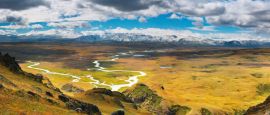Mongolia History, Language and Culture
History of Mongolia
The Hunnu (Xiongnu) Empire was the first great confederation of tribes to occupy the land of present-day Mongolia. It was these raiding tribes that ultimately caused the Chinese to build the Great Wall of China. Under the leadership of Genghis Khan, the Mongol Empire (1206-1368) stretched from Korea to Hungary. Even today, Mongolians view this period as their golden age and Khan still enjoys God-like reverence.
After the fall of the Qing Dynasty in 1911, Mongolia declared independence from China and formed close allies with the Soviet. Following the revolutions of 1989, the Mongolian Revolution of 1990 overthrew the communist party in charge without bloodshed. Although a multi-party system was established quickly, the Mongolian People's Revolutionary Party remained in power until 1996.
Mongolia's foreign relations are dominated by its giant neighbours, China and Russia, and based on various bilateral friendship treaties. However, in recent times, the Mongolians have quietly begun developing closer ties with the West. In 2003, for example, a small but symbolically significant contingent of Mongolian troops was dispatched to Iraq to support the US-led military operation.
Did you know?
• Mongolia's first pop-rock band, Soyol Erdene, formed in 1971. They are still active today.
• The country's main festival, Naadam, in which participants compete in horse racing, archery and traditional Mongolian wrestling, known as bökh, has existed for centuries and is held throughout the country in July.
• On 21 November 2005, George W. Bush became the first sitting US President to visit Mongolia.
• Mongolia does not have a navy.




 You know where
You know where